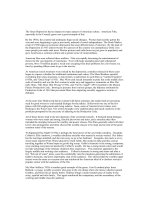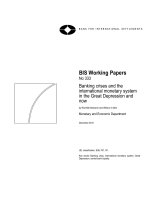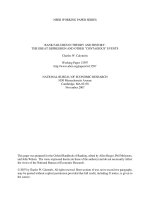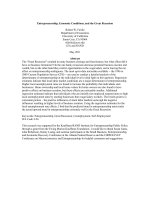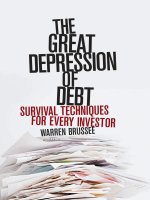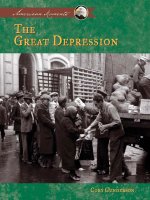american comedy and the great depression
Bạn đang xem bản rút gọn của tài liệu. Xem và tải ngay bản đầy đủ của tài liệu tại đây (35.97 KB, 2 trang )
The Great Depression had an impact on many aspects of American culture. American Film,
especially in the Comedy genre was a good example of this.
By the 1930s, the country had undergone huge social changes. Women had recently gotten the
vote and were beginning to gain a previously unheard of social independence. The Stock Market
crash of 1929 began an economic depression that soon affected most of America. By the peak of
the Depression in 1933 almost twenty-five percent of the country was unemployed, while even
more people just made ends meet. Motion pictures and radio however just grew in popularity and
gave Americans a common culture and a greater sense of connectedness.
American film soon reflected these realities. Film was rapidly becoming the entertainment of
choice for the vast majority of Americans. Even with huge unemployment and widespread
poverty, 60 to 70 million people a week were escaping from their problems for a few hours at a
time by spending fifteen cents to go to the movies.
As American social structures were rocked by the depression, comedies released in these years
began to express a disdain for traditional institutions and values. The Marx Brothers spoofed
everything from class structures, to universities, to patriotism in such films as "Animal Crackers"
(1930), and "Duck Soup" (1933). Mae West used sexual innuendo to poke fun at the middle class
code of morality and was the first woman to make racy and suggestive comments on film. Her
early films, "She Done Him Wrong" (1933), and "I'm No Angel" (1933) resulted in the Motion
Picture Production Code. Bowing to pressure from various groups, the Industry instituted the
Production Code of 1934 that prevented films from depicting sexually suggestive actions or
dialogue.
At the same time Hollywood had to contend with these restraints, the studios had an increasing
need for good writers to craft needed dialogue for the talkies. Hollywood was one of the few
places with full employment and rising salaries. Soon, some of America's best writers were
flocking to the West Coast. The writers brought a new sophistication and much creativity to the
problems prompted by the necessity of adhering to the Production Code.
All of these factors lead to the development of the screwball comedy. It featured sharp dialogue,
women who were smart and strong, fanciful plot twists and turns, and a storyline that often
included the interplay between the wealthy and poorer classes. The films generally sided with their
lower class protagonists and often showed the wealthy classes to be inept and in need of the good
common sense of the masses.
"It Happened One Night" (1934) is perhaps the best known of the screwball comedies. Claudette
Colbert is Ellie Andrews, a wealthy rebellious socialite who married a society wastrel. Her father
has the marriage annulled, and she runs away to go to her husband. Incognito, she meets a savvy
street-smart reporter Peter Warne played by Clark Gable. She needs his help and they end up
traveling together as Warne hopes to get the big scoop. Gable's character is the strong, competent,
wise cracking everyman not dazzled by Colbert's wealth. He has a strong moral center and would
not take advantage of the intimate situations they experience. This character appealed to the
largely middle and working class audience. Colbert's character is strong and smart and after a
few "fish out of water" jokes, soon fits comfortably into the situations garnering the admiration of
Gable's character, and more importantly, that of the audience. This showed that the wealthy upper
classes were the same as everyone else and reinforced the American ideal of a classless society-a
popular notion with the audiences of the 30s.
My Man Godfrey (1936) is another good example of the genre. Carol Lombard plays Irene
Bullock, a young, wealthy eccentric who goes to the city dump where she meets a derelict named
Godfrey, and hires him as family butler. Godfrey brings a much-needed sense of reality to the
crazy, spoiled and rich family. This again reinforced the competency and the ascendancy of the
working and middle class-the audience.
While relating to the harsh times, these settings not only capture the emotions of its audience but
also manipulate them with a positive turn of events at the end. Film Historian Ed Sikov says that
they serve the cultural function of humanizing the wealthy, especially in a time of widespread
poverty and social unrest
The Great Depression was the biggest socio-economic event of the 1930s, it is fitting that it had an
important impact on a major aspect of American culture - our films. The films also had a huge
impact on the Society. President Franklin Roosevelt said: "During the Depression, when the spirit
of the people is lower than at any other time, it is a splendid thing that for just 15 cents an
American can go to a movie and look at the smiling face of a baby and forget his troubles."
